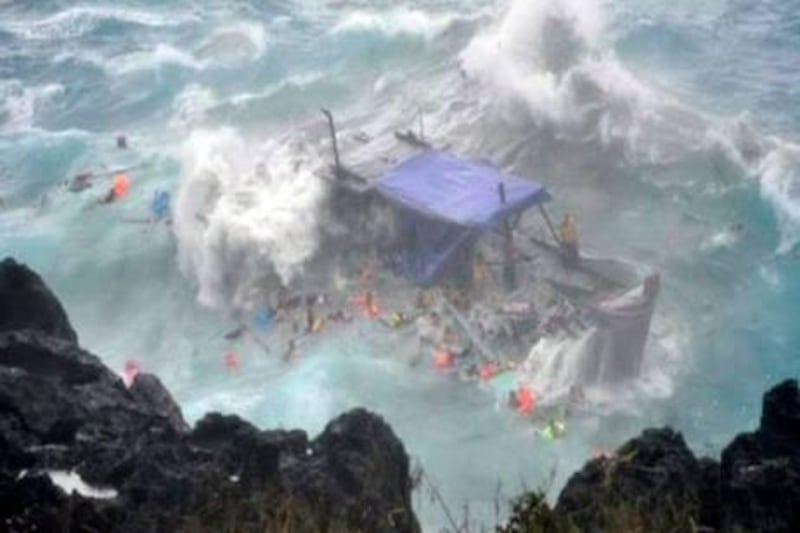SYDNEY // The deaths of at least 30 asylum-seekers off the Australian territory of Christmas Island last week have highlighted the dangers facing people fleeing persecution in Iraq and Iran.
Although the precise number of passengers on the boat that smashed into cliffs in mountainous seas on Wednesday is not known, all are believed to have come from Iran and Iraq. Of the 42 survivors, the most seriously injured have been airlifted to Perth, 2,600km to the south-east, while the rest are in Christmas Island's hospital and detention camp.
The shipwreck - footage of which was beamed into living rooms across Australia and around the world - has reignited the bitter refugee debate and catapulted the issue to the top of the political agenda. Julia Gillard, the prime minister, cut short a holiday to announce three separate inquiries and fend off accusations that navy patrol ships should have spotted the wooden fishing boat before it approached the island's treacherous coastline.
The tragic events have also reinforced the perilous nature of the voyage from Indonesia across the Indian Ocean - the final leg for most asylum-seekers trying to reach Australia. Hundreds of lives have been lost at sea in recent years, thanks to the people smugglers who transport passengers in cramped, often unseaworthy boats, after pocketing fees of up to US$25,000 (Dh92,000) per person, according to refugee advocates.
On Christmas Island - just 355km from Java, and the first inhabited Australian land encountered by vessels heading south - the grim task of identifying the dead began this weekend as rescuers scoured the rough seas for more bodies. At least eight children died when the boat hit jagged rocks and broke up, under the horrified gaze of islanders who hurled life vests and ropes into the water.
Many on board were Iranian and Iraqi Kurds, and community groups in Australia have been inundated with anxious calls from those two countries, with people trying to find out whether family members were on the boat. The names and nationalities of victims and survivors have not been released, although the government has set up a hotline for relatives.
The bereaved include one man who was already in Christmas Island's detention centre - Australia's main offshore processing facility - after previously undertaking the same voyage. His wife, uncle and five other relatives perished, Australian officials have confirmed. The survivors include a child who lost both parents in raging seas whipped up by cyclonic weather.
Sighted on December 25, 1643 by a British naval captain, the rugged island - a British colony until 1958 - is populated mainly by Malay and Chinese descendants of indentured workers shipped over in the late 19th century to work in phosphate mines.
In 2001, it became a symbol of Australia's draconian refugee policy, after John Howard's government deployed the military's elite Special Air Service to prevent a Norwegian tanker, the Tampa, from landing with a cargo of shipwrecked Afghans and Iraqis.
Over the past year or so, the number of asylum-seekers reaching its shores has risen dramatically, to more than 6,000 in 2010. Iranians and Iraqis make up the second- and third-largest groups, respectively, after Afghans, with 1,519 people from the two countries claiming asylum so far this year. Kurds are among the 650 stateless people to arrive in 2010.
Jamal Daoud, of the Social Justice Network, which works closely with immigration detainees, believes many people on the wrecked boat were Feyli Kurds - Shiites deported from Iraq to Iran in the 1980s by Saddam Hussein and denied citizenship and basic rights in Iran. "Other Iraqis want to get away from harassment by militia groups or just the general unsafety of Iraq," he said.
Iraqi Christians are another group fleeing persecution; in Iran, meanwhile, religious minorities and political opponents of Mahmoud Ahmadinejad, the president, are under increasing pressure, according to Nasrim Massiri, the spokeswoman for the Iranian Society of Victoria. Young people, in particular, are leaving. Ms Massiri said: "I've been receiving calls from parents in Iran who don't know whether their sons were on that boat, whether they are alive or dead."
The customary route for Middle Eastern asylum-seekers is to fly to Kuala Lumpur, then sail to Indonesia's Java or Sumatra islands. Some wait years in Indonesia before risking their lives and savings on the Indian Ocean crossing. "The sad thing is that they travelled so far and got so close," said Paul Maberly, one of many Christmas Islanders struggling to come to terms with last week's events.
Paul Power, the president of the Refugee Council of Australia, said the shipwreck had reinforced the urgent need for a regional framework establishing better protection for asylum-seekers and refugees in Southeast Asian transit countries. "We want to see a situation where people don't feel there's no other option but to put their lives at risk and be seriously ripped off [by people smugglers]," he said.
In Australia, perhaps for the first time, the disaster gave the asylum-seeker issue a human face. Not even those who dismiss boat people as "queue-jumpers" could have failed to be moved by footage of men, women and children screaming for help as their vessel was dashed to bits.
While the accident was particularly shocking because it was witnessed and filmed, many more asylum-seekers have died at sea unobserved. In the worst instance, 353 people died when their boat sank off Indonesia in 2001.
There are hints that the shipwreck may prove to be a political watershed. Writing in The Australian newspaper yesterday, a key adviser to the ruling Labor Party, Cameron Milner, said it highlighted the need for a more humane approach.
However, Bob Katter, one of three independent MPs propping up Ms Gillard's minority government, called for a tougher stance, describing current policies as an "open honeypot" for asylum-seekers.





